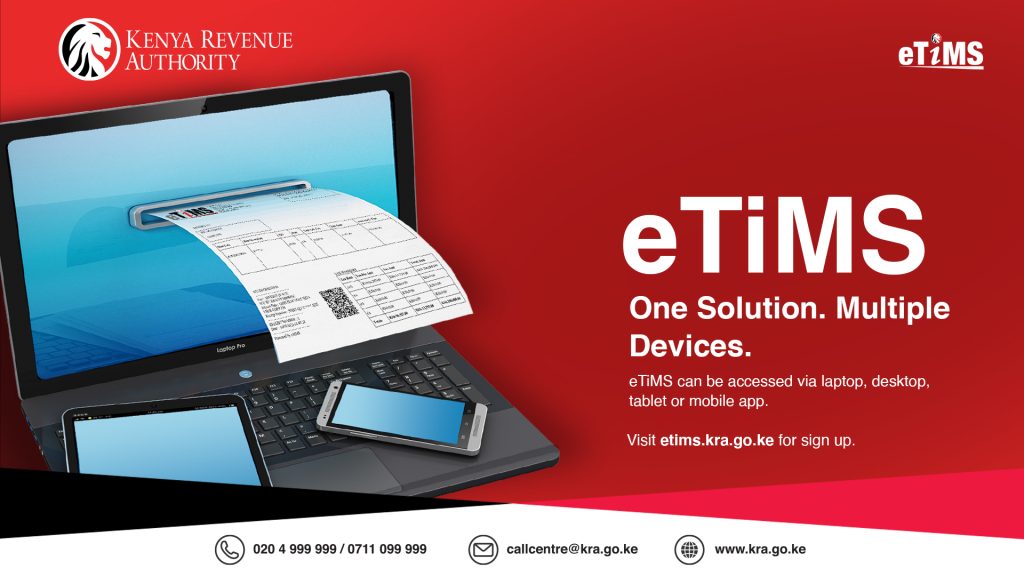
Simplified Tax Solutions Unveiled
Kenya Revenue Authority (KRA) has introduced a tax reform that exempts small traders from the electronic Tax Invoice Management System (eTIMS). This decision, welcomed by traders and policymakers alike, aims to simplify compliance, reduce costs, and address technological barriers. Small and medium enterprises (SMEs), particularly in rural areas, have long struggled with high compliance costs under digital tax systems.
We explore the exemption’s implications, its broader impact on Kenya’s economy, and how it aligns with regional trends in tax digitization.
What Prompted the Exemption?
The eTIMS was developed to boost VAT compliance and improve real-time transaction tracking. However, for small traders, the system introduced significant challenges:
- Cost Concerns: SMEs faced high expenses in acquiring and maintaining eTIMS-compliant software and devices.
- Technological Barriers: Limited internet access in rural areas rendered compliance impractical for many traders.
- Operational Complexity: The technical nature of eTIMS overwhelmed businesses with little to no digital literacy.
Recognizing these challenges, the government opted to revise the requirements. Small traders will now operate under a simplified system, enabling them to record transactions without electronic invoices.
Key Changes in the Tax System
The exemption applies to businesses earning between KSh 1 million and KSh 25 million annually. These traders are now allowed to maintain manual or simplified records instead of submitting electronic invoices.
Key benefits include:
- Lower Compliance Costs: Eliminating the need for specialized software significantly reduces expenses.
- Enhanced Accessibility: Traders in underserved regions can now comply without requiring high-speed internet.
- Focus on Informal Traders: The changes encourage informal sector businesses to register for turnover tax voluntarily.

Impacts on Small Traders
The exemption is expected to transform how small businesses interact with tax authorities. Here’s what it means for traders:
- Increased Profitability: Lower compliance costs free up resources that businesses can reinvest into growth.
- Improved Ease of Doing Business: Simplified processes will encourage more traders to formalize their operations.
- Reduced Fear of Penalties: Non-digital systems lower the risk of accidental non-compliance.
Implications for Kenya’s Economy
While the exemption will likely result in a temporary dip in VAT collections, it positions Kenya for long-term revenue growth. Broadening the tax base by encouraging voluntary compliance could offset initial revenue losses. Additionally, by supporting small traders, the government promotes job creation and economic stability.
Role of Technology in Tax Administration
Digital transformation remains a key focus for the KRA. Although eTIMS faced criticism, it succeeded in onboarding over 76,000 VAT-registered taxpayers. The new simplified system complements this progress by catering to small traders while maintaining oversight for larger businesses.
For Kenya, leveraging technology to balance compliance and inclusivity is crucial. The eTIMS exemption showcases this adaptive approach, ensuring no trader is left behind in the digital transition.
Regional Comparisons: Lessons from Africa
Kenya’s approach reflects a broader trend in Africa. Governments across the continent are adopting digital tax systems, tailoring them to local conditions:
- Rwanda: Implemented a mobile tax system for SMEs, reducing the need for physical infrastructure.
- Uganda: Introduced a scaled-down invoicing system for small businesses, enhancing compliance rates without overburdening traders.
By learning from its neighbors, Kenya aims to optimize its tax strategies while fostering regional competitiveness.
FAQs
What is eTIMS, and why is it controversial?
eTIMS is a digital tool for VAT compliance. Traders criticized it for being costly and difficult to use.
Who qualifies for the new exemption?
Businesses earning between KSh 1 million and KSh 25 million annually are exempt.
When will the changes take effect?
The simplified system is expected to roll out by January 2024.
Will this affect VAT collections?
Initially, VAT collections may decline, but the broader tax base is expected to stabilize revenue in the long term.
How does this compare with other African countries?
Similar systems in Rwanda and Uganda have succeeded in balancing compliance with accessibility for SMEs.
Also Read: Taifa Care: Kenya’s Bold Step Towards Universal Healthcare
The KRA’s exemption for small traders marks a pivotal step in Kenya’s journey toward inclusive and practical tax administration. By addressing the unique challenges faced by SMEs, the government creates an enabling environment that supports growth, formalization, and long-term economic stability.
For businesses, the new system offers a chance to focus on their core operations without the burden of costly compliance. Meanwhile, Kenya solidifies its reputation as a regional leader in adaptive fiscal policies.
This development signals a brighter future for small traders and underscores the importance of tailoring tax systems to local realities. For ongoing updates on tax reforms, stay tuned to our coverage.





